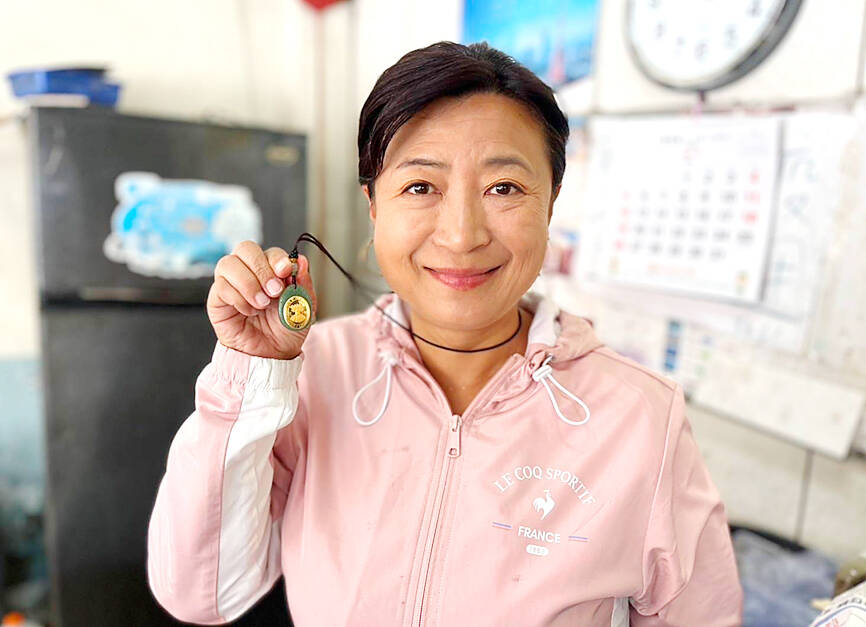The Democratic Progressive Party’s (DPP) Tsai Pei-hui (蔡培慧) yesterday narrowly beat the Chinese Nationalist Party’s (KMT) Lin Ming-chen (林明溱) by 1,925 votes to win a Nantou County legislative by-election.
Tsai won 45,218 votes, or 49.44 percent of the total, while Lin garnered 43,293, or 47.34 percent, election officials said.
During the afternoon, as local polling stations started reporting ballot counts, Lin was trailing by about 2,000 votes.

Photo courtesy of Tsai Pei-hui’s campaign office via CNA
“This is a demonstration of Taiwan’s democratic spirit,” Tsai said in Nantou City after Lin conceded at about 5:30pm.
She promised to start her work as legislator tomorrow, adding that in addition to the policies she proposed in the campaign, she would also seek to implement some policies proposed by Lin.
“One by one, I will work hard to implement these programs, including improving social welfare for the elderly, while pushing for funding for more large hospitals, attracting more industry and building science parks for our county,” she said.
Vice President William Lai (賴清德), who is chairman of the DPP, said Tsai’s victory has given the party a much needed boost, after three consecutive defeats since last year’s nine-in-one local elections.
“This is a crucial turning point for the DPP to start a winning streak against the KMT,” he said of the party’s first electoral victory since he became chairman.
“It will end the string of defeats so our party can consolidate support with the aim of winning the upcoming elections,” he said in a statement.
KMT county commissioners and legislators have dominated Nantou politics for most of the past 20 years. The last DPP member to win in the county was Lin Tsung-nan (林宗男), who was county commissioner from 2001 to 2005, preceded by DPP commissioner Peng Pai-hsien (彭百顯), who served from 1997 to 2001.
President Tsai Ing-wen (蔡英文) also congratulated Tsai Pei-hui, who was a legislator-at-large from 2016 to 2020.
“Tsai Pei-hui will return to the legislature, and she will strive diligently to work for Nantou County, and bring the values of our party to provide better care and look after the people,” Tsai Ing-wen said in a statement.
“Winning this election is only the start of the hard work ahead... When people rally together, we can overcome difficulties and tough challenges, and strive forward to progress on the road ahead,” she said.
Lin called the election unfair, saying that Tsai Pei-hui had more resources than he did, adding that he had been “running out of weapons and ammunition” toward the end.
“So we lost by just more than 1,000 votes — a very small margin. We did not put in enough effort in this race, although we had the chance to win... Also I was tarnished by media reports, and was tainted by a smear campaign, that is why in the end I lost narrowly,” Lin said.
Also on the ballot were independent candidate Chen Tsung-chien (陳聰鑑), former mayor of Mingjian Township, and Lu Yu-chun (魯昱君), a retired school counselor and former military political affairs officer. They received 2,528 and 421 votes respectively.
The turnout was 46.35 percent of the 198,412 total eligible voters, considered high for the district, the Central Election Commission said.

CHAOS: Iranians took to the streets playing celebratory music after reports of Khamenei’s death on Saturday, while mourners also gathered in Tehran yesterday Iranian Supreme Leader Ayatollah Ali Khamenei was killed in a major attack on Iran launched by Israel and the US, throwing the future of the Islamic republic into doubt and raising the risk of regional instability. Iranian state television and the state-run IRNA news agency announced the 86-year-old’s death early yesterday. US President Donald Trump said it gave Iranians their “greatest chance” to “take back” their country. The announcements came after a joint US and Israeli aerial bombardment that targeted Iranian military and governmental sites. Trump said the “heavy and pinpoint bombing” would continue through the week or as long

TRUST: The KMT said it respected the US’ timing and considerations, and hoped it would continue to honor its commitments to helping Taiwan bolster its defenses and deterrence US President Donald Trump is delaying a multibillion-dollar arms sale to Taiwan to ensure his visit to Beijing is successful, a New York Times report said. The weapons sales package has stalled in the US Department of State, the report said, citing US officials it did not identify. The White House has told agencies not to push forward ahead of Trump’s meeting with Chinese President Xi Jinping (習近平), it said. The two last month held a phone call to discuss trade and geopolitical flashpoints ahead of the summit. Xi raised the Taiwan issue and urged the US to handle arms sales to

A magnitude 5.6 earthquake struck off the coast of Yilan County at 12:37pm today, with clear shaking felt across much of northern Taiwan. There were no immediate reports of damage. The epicenter of the quake was 16.9km east-southeast of Yilan County Hall offshore at a depth of 66.8km, Central Weather Administration (CWA) data showed. The maximum intensity registered at a 4 in Yilan County’s Nanao Township (南澳) on Taiwan’s seven-tier scale. Other parts of Yilan, as well as certain areas of Hualien County, Taipei, New Taipei City, Taoyuan, Hsinchu County, Taichung and Miaoli County, recorded intensities of 3. Residents of Yilan County and Taipei received

Taiwan has secured another breakthrough in fruit exports, with jujubes, dragon fruit and lychees approved for shipment to the EU, the Ministry of Agriculture said yesterday. The Animal and Plant Health Inspection Agency on Thursday received formal notification of the approval from the EU, the ministry said, adding that the decision was expected to expand Taiwanese fruit producers’ access to high-end European markets. Taiwan exported 126 tonnes of lychees last year, valued at US$1.48 million, with Japan accounting for 102 tonnes. Other export destinations included New Zealand, Hong Kong, the US and Australia, ministry data showed. Jujube exports totaled 103 tonnes, valued at